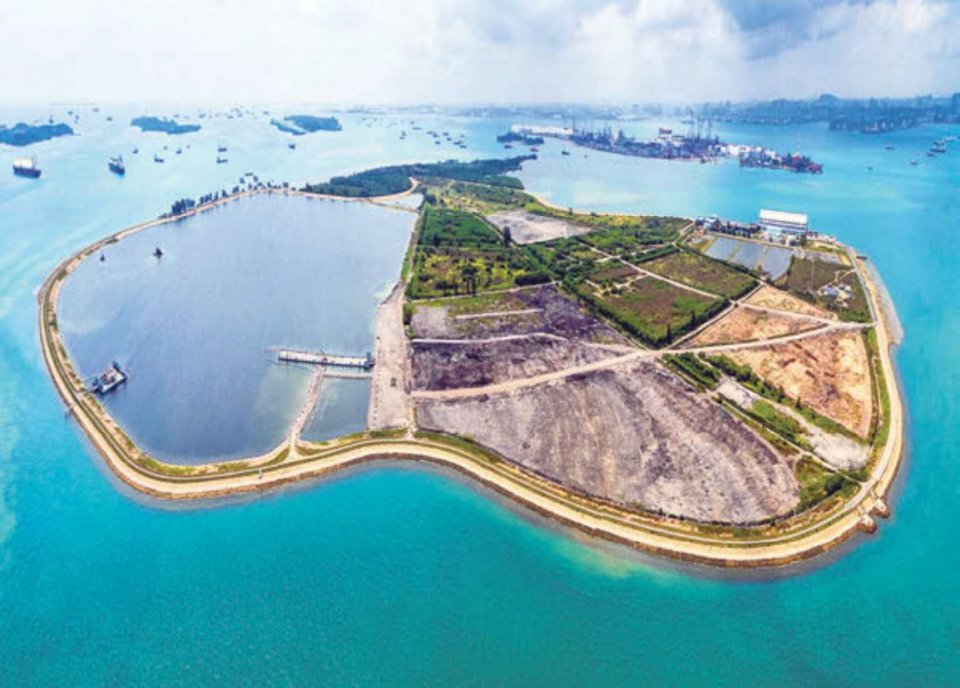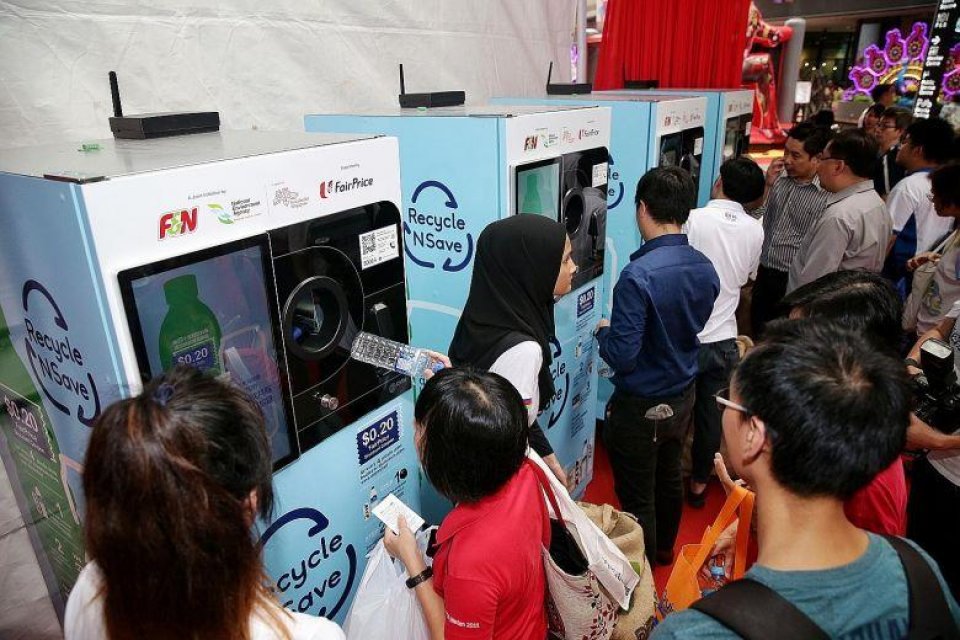
A newly designed recycling bin in Singapore carries clearer labelling indicating what can and cannot be recycled. Some 40 per cent of recyclables in Singapore are contaminated by food or liquids, as they are deposited unseparated and often unwashed in the country's blue recycling bins. Image: Eco-Business
In fast-paced, efficient Singapore, green habits are more likely to be formed if they are convenient than through education, Member of Parliament Louis Ng said this week.
In compact, efficient Singapore, convenience is the best way to drive more sustainable consumer behaviour—even trumping education, a politician said this week. Speaking on a panel to mark the launch of a sustainable products store, Louis Ng, Member of Parliament for Nee Soon constituency, said that if a policy makes it convenient for people to change their behaviour, change will happen much faster than educating people about why they should adopt green habits.
“Education plays a role, but ultimately convenience plays the biggest role,” he said. “People don’t want to harm the environment. They take a plastic bag [from a supermarket] because it’s convenient, and it’s very inconvenient to take a reuseable bag with you everywhere you go,” he said. Ng said that a simple policy tweak based around convenience could improve Singapore’s recycling rate—which at 59 per cent, is among the lowest in the developed world.
A major impediment to recycling in Singapore is the contamination of recyclables, which Ng noted “kills recycling”. Some 40 per cent of recyclables deposited in blue recycling bins beneath the high-rise apartment blocks where the majority of the population lives cannot be recycled, because items are tarnished with food or liquid. “People are throwing rubbish into the recycling bins not because they deliberately want to contaminate recyclables, but because they don’t have a convenient alternative,” said Ng. He proposes regular waste bins to be placed next to all recycling bins so that citizens have the option of recycling or discarding regular trash. This is why new public housing blocks have been built with separate garbage chutes for recyclables—so that residents do not need to walk down to the foot of their blocks to recycle, Ng noted.
Ng is also pushing for a levy on plastic bags to reduce the amount of plastic bags Singapore residents use, estimated to be about 13 per person per day. However, he is against a ban on single-use plastic bags, even as the use of disposables soars as a result of the Covid-19 pandemic, mainly from deliveries packaging. “It’s almost impossible to ban single-use bags,” said Ng, pointing out that residents need them to hygienically deposit their trash down garbage chutes in high-rise apartment blocks.
Singapore’s recently appointed environment minister recently said that the city-state was “in no hurry” to phase out plastic bags, even though other many countries had done so because of their environmental impact. Biodegradables, a ‘waste of your time’ Environmentally-conscious shoppers are not helping the planet by buying biodegradable products in Singapore, Ng said on the panel discussion on sustainable consumption and greenwashing, hosted by The Green Collective, on Thursday. “Buying biodegradable products in Singapore is a waste of your time,” he said. “It might cost more energy and carbon to make biodegradable products compared to other products, and in the end it’s all burned up. We don’t landfill our rubbish, so it might be greener to avoid biodegradable products,” said Ng. Biodegradable products break down into natural elements after they’re used, unlike durables such as plastic. However in Singapore, almost all trash is burned in waste-to-energy plants.
Ng’s comments followed those of Florence Tay, co-founder of Unpackt, Singapore’s first zero-waste grocery store. She said that the most common question customers ask her is whether or not a product is biodegradable. “Customers ask this thinking they mean compostable. So when they buy a product they think it’s not harming the planet,” she said. Although biodegradable materials return to nature eventually, they sometimes leave behind metal residue, whereas compostable materials are nutrient-rich and useful for plants. “We ask customers if they are really looking for biodegradable or compostable products, and if they can really compost these items when they’ve finished with them.”
Interest in composting has grown during the pandemic, as more people have been cooking at home, producing more food waste. Tay said there was a need for a standardised labelling system that informed consumers what is meant by biodegradable and compostable, and what is required for a product to degrade properly. She noted that some products labelled biodegradable that she has tested herself had not broken down. Biodegradable plastic is one material that has drawn criticism for misleading consumers, as it can take years to degrade and once it does, leaves smaller particles that are at least as environmentally damaging as more durable plastic.
Ng said that the focus of efforts to address sustainable consumption in Singapore should not be about different types of consumption, rather reducing it. This, he said, is why his efforts in parliament have focused on “refuse and reduce” rather than recycling. “People say we should just recycle everything. But the amount of energy needed to recycle is significant, and recycling is often not done in Singapore. So it might actually be better to just incinerate,” he said. Though Singapore recycled just 4 per cent of the plastic it generated last year, the environment ministry recently announced plans to increase the land-constrained city-state’s recycling capacity.





